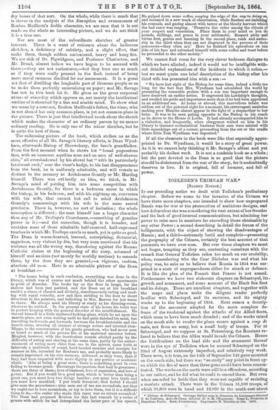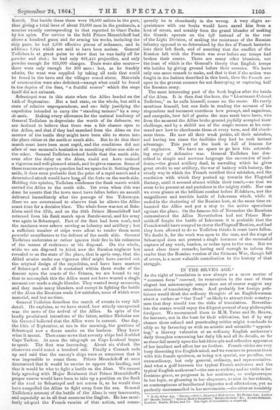TODLEBEN'S tRIMEAN WAR,* [SECOND Norms.]
Ix our preceding notice we dealt with Todleben's preliminary chapter. Before we come to the invasion of the Crimea we have three more chapters, one intended to show how unprepared Russia was for war or the prosecution of ambitious designs, and how defenceless she was considering the vast extent of her frontier and the lack of good internal communications, but admitting her power to raise men in numbers far exceeding.those obtainable by any other Power; a second describing in detail the forces of the belligerents, with the object of showing the disadvantages of Russia ; and a third—extremely lucid and complete—presenting the geography of the Crimea, certainly the best account of that peninsula we have ever seen. But over these chapters we must not linger, tempting as they are, contenting ourselves with the remark that General Todleben relies too much on our credulity, when, remembering who the Czar Nicholas was and what his policy was, he asks us to believe that Russia in 1854 was sur- prised in a state of unpreparedness either for attack or defence. It is like the plea of the French that Franoe is not armed. Furthermore we have two elaborate chapters on Sebastopol, its . growth and armament, and some account of the Black Sea fleet and its doings. These are excellent chapters, and together with the maps and plans make the diligent reader perfectly familiar with Sebastopol, and its environs, and its mighty works up to the beginning of 1854. Next comes a descrip- tion of the measures adopted for the more complete de- fence of the roadstead against the attacks of the Allied fleets, which seem to have been much dreaded ; and of the works raised on the south side to render the place secure against a coup de main, not from an army, but a small body of troops. For at Sebastopol, and we suppose at St. Petersburg, the Russians re- fused to believe that the Allies would invade the Crimea. Hence the fortifications on the land side and the armament thereof were in the eye of Todleben when he entered Sebastopol on the 22nd of August 'extremely imperfect, and relatively very weak. There were, it is true, on the 14th of September 145 guns mounted on the south side, but there was "scarcely" any point in front up- on which the fire of more than three guns could have been concen- trated. The works on the north were still less efficacious, according to our author, and he did what he could to amend thorn. But even when amended he holds that they were not capable of resisting a resolute attack. There were in the Crimea 51,500 troops, of which 38,000 were in baud and 12,000 in the south-east about • Defense de Sebastopol. Ouvrage Dedige Sous la Direction du Lieutenant-General E de Todleben, Aide•de-Camp General de S. M. l'Empereur. Tome L, Premiere et Deuxibme Partie. Saint Petersboura. Imprimerie N. Thiebliu et Cie. ISO.
Kertch. But beside these there were 18,500 sailors in the port, thus giving a total force of about 70,000 men in the peninsula, a number exactly corresponding to that reported to Omer Pasha by his spies. For service in the field Prince Menschikoff had above a hundred guns; and for arming his works, including the ship guns, he had 2,839 effective pieces of ordnance, and in additiva 1,914 which are said to have been useless. General Todleben is at great pains to show that he was badly off for powder and shot ; he had only 891,445 projectiles, and only powder enough for 325,000 charges. Tools were also scarce— there were only enough for 200 men ; but, as he frankly admits, the want was supplied by taking all tools that could be found in the town and the villages round about. Materials of construction were also deficient—except what could be found in•the depots of the fleet, " a fruitful source" which the siege itself did not exhaust.
Sebastopol was in this state when the Allies landed on the 14th of September. Not a bad state, on the whole, but still a state of relative unpreparedness, and one fully justifying the expedition intended to carry the "standing menace" by a coup de main. Making every allowance for the natural tendency of General Todleben to depreciate the worth of its defences, we are inclined to believe that there was a fair chance open to the Allies, and that if they had marched from the Alma on the morrow of the battle they might have been able to storm into the place either at the north or south side. But to do this their march must have been most rapid, and the conditions did not allow of one moment's hesitation in assaulting either one side or the other. General Todleben indeed holds that the north side, even after the delay on the Alma, could not have resisted a vigorous and well-planned attack, and he gives reasons. Some of these reasons are open to question had we space for it. Setting them aside, it does seem probable that the prize of a rapid march and a determined attack would have bey all the forts on the north side. Holding this opinion, Todleben condemns the flank march which carried the Allies to the south side. Yet even when this was done he asserts that the town must have fallen before an assault delivered immediately after the passage of the Tchernaya. Here we are constrained to observe that he allows the Allies scant time for a decisive blow. The whole force was not at Bala- klava until the 27th, and on the 29th Prince Menschikoff had returned from his flank march upon Batchi-serai, and his army was again in Sebastopol. Part of the fleet had been sunk, and the mariners were ashore serving as infantry and artillery ; but a sufficient number of ships were afloat to render them most powerful contributors to the defence of the south side. General Todleben underrates or rather ignores their fire in his estimates of the means of resistance at his disposal. On the whole, while we are disposed to think now the Russian engineer has revealed to us the state of the place, that is apres coup, that the Allied armies under one vigorous chief might have carried out the original design of the expedition, and have been masters of Sebastopol and all it contained within three weeks of the descent upon the coasts of the Crimea, we are bound to say that to accomplish this the Allies must not have wasted a single moment nor made a single blunder. They wasted many moments, and they made many blunders, and except in fighting the battle of the Alma the Russians made few mistakes, none of which were material, and lost no time.
General Todleben describes the march of events in very full detail. He explains, as we have stated, how utterly unexpected was the news of the arrival of the Allies. In spite of the loudly proclaimed intentions of the latter, neither Nicholas nor his General believed that the Allies were in earnest. One day, the 13th of S3ptember, at ten in the morning, the garrison of Sebastopol saw a dense smoke on the horizon. They knew what it meant. Then came news that seventy ships had doubled Cape Tarkan. At noon the telegraph on Cape Loukoul began to speak. The fleet was increasing. About six o'clock the observers could count a hundred sail. Finally a Cossack rode up and said that the enemy's ships were so numerous that it was impossible to count them. Prince Menschikoff at once determined that it would be unwise to oppose the landing, and that it would be wise to fight a battle on the Alma. We cannot help agreeing with Major Brialmont that Prince Menschikoffs proper course would have been to take up a position on the flank of the road to Sebastopol and not across it, as he would thus have compelled the Allies to fight away from the sea. General Todleben's account of the battle of the Alma is very inaccurate, and especially so in all that concerns the English. He has mani- festly adopted the French version of that action, and conse-
quently he is abundantly in the wrong. A very slight ac- quaintance with our books would have saved him from a host of errors, and notably from the grand blunder of making the Guards operate on the left instead of in the rear of the Light Division, of making the resistance of the Russian infantry opposed to us determined by the fire of French batteries into their left flank, and of asserting that the conflict of the Russian left with the French was over before our troops had broken their centre. There are many other blunders, not the least of which is the General's theory that English troops win battles by giving ground before their enemies. We have only one more remark to make, and that is that if the action was fought in the fashion described in this book, then the French are open to the gravest censure for not destroying or capturing half the Russian army.
The most interesting part of the book begins after the battle of the Alma. It is then that the hero, the " Lieutonant.Colouel Todleben," as he calls himself, comes on the scene. He rarely mentions himself, but one feels in reading the account of his stupendous and incessant exertions how prompt, and sagacious, and energetic, how full of genius the man must have been, who from the moment the Allies broke ground joyfully accepted their challenge, and by a skilful use of the ample means at his com- mand saw how to checkmate them at every turn, and did check- mate them. He saw all their weak points, all their. mistakes, and having ten times the &unities they had ho took instant advantage. This part of the book is full of lessons for all engineers. We have no space to go into this astonish- ing story of defensive war. General Todleben has des- cribed in simple and nervous language the succession of inci- dents,—the grand artillery duel, in narrating which he gives great credit to our artillery, the war of battery with battery, the steady way in which the French rectified their mistakes, and the resolution with which they pushed up towards the Flagstaff Battery, until it seemed almost within their reach,—so that we seem to be present at and partakers in the mighty strife. Nor can we even glance at the brilliant combat before Balaklava, nor the magnificent and terrible battle of Inkerman which, while it ended in the shattering of the Russian host, at the same time ex- hausted the Allies and put a stop to the active operations against the place. On the famous 5th of November the Russians outnumbered the Allies Nevertheless had not Prince Men- schikoff fought the battle of Inkerman it is probable that the Frenchwould have essayed to storm theFlagstaff Bastion, and had they been allowed to do so Todleben thinks it must have fallen. We doubt it, for the work was open to the roar, and the siege of Sebastopol does not present a single instance of the successful capture of any work, bastion, or redan open to the rear. But we must close these remarks, having said enough to inform the reader that the Russian version of the Crimean War, though full of errors, is a most valuable oontribution to the history of that struggle.































 Previous page
Previous page